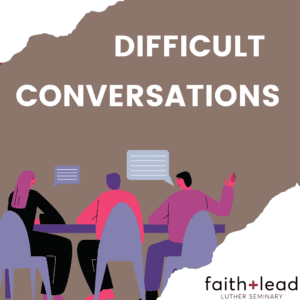It was a typical Sunday morning at the church I worked at in Philadelphia. Everything and everyone was running about 15 minutes late, including the church musician. Besides the normal delay, however, the service went relatively smoothly, which was always a blessing at this particular church. The only thing that seemed a little off was that during the service, the chair of the worship committee, Clyde, and the chair of the women of the ELCA chapter at the church, Ellen, seemed to be more obvious about their feelings for each other than usual.
When I say feelings, I don’t mean the warm and fuzzy kind. I mean the “I hate the way you look; I hate the way you smell, and I can’t stand to be breathing the same air as you” kind. Clyde and Ellen had disliked each other as long as anyone could remember. They had a sort of “sibling rivalry,” in which they tended to vie for similar leadership roles and get on each other’s nerves while doing it. Both were on church council, and the pastor (and I) had to spend much of our time keeping them from being at each other’s throats during meetings. Everyone knew of their constant feuds, and members of the congregation typically took sides each time they blew up at one another.
Most recently, both of them had run for the position of chair of the worship committee—and Clyde had won. Ellen was very upset about this and was very vocal about her disapproval of being “beat out” for the position. Shortly after that, she was voted into the chair position of the women’s group—probably because congregation members wanted to appease her, and thought that giving her another leadership role to excel at would keep the two from blowing up.
The Sunday in question was about 2 weeks after both of these positions had been elected, and after worship Ellen and one other church member were in the back of the church counting the offering. Clyde, probably knowing that using his power as the newly-elected worship chair would irk Ellen, began to berate Ellen and the other counter for not counting the offering “correctly” (how he thought the correct way should be). This display of power of course sent Ellen into a rage, which sent Clyde into a rage, which resulted in the screaming of obscenities, name-calling, and hand gestures that I wish I could forget.
When Ellen came to the pastor and me about what had happened right after the incident, both of us calmly suggested that, although Clyde’s actions may not have been appropriate, perhaps her actions may not have been Christ-like. Her response? “I know they weren’t. So I looked up to Jesus before I said it and said ‘Lord, forgive me for what I’m about to do!’ And then I let him have it!”
Why conflict happens
Conflict happens regularly in congregations. Addressing it constructively requires some particular skills. You can probably think of a situation similar to Ellen and Clyde that you’ve seen or experienced yourself in your own congregation.
There are many of us who would rather avoid these often awkward and uncomfortable situations, but avoidance isn’t really possible. God has made us all different, which is fantastic from a Body of Christ perspective (1 Corinthians 12). We are all given different spiritual gifts and called by God to serve in different roles.
All of us being different also means that not all of us are going to always get along. It’s not a question of if conflict or difficult conversations are going to happen at your congregation—it’s a matter of when. As Max Lucado writes in his book When God Whispers Your Name, “Conflict is inevitable, but combat is optional.”
If we want to keep “combat optional,” it’s good to have some tools in the toolbox for when conflict pops up. One of these tools is coaching. Ongoing conflict that is not addressed can shape the culture of entire congregations.
Coaching through conflict
Coaching is a way for folks who are either involved in the situation themselves, or helping within the situation, to think and talk through everything with an outside party. For situations of ongoing conflict, it is an important option to present. Some denominations have training processes for coaches, so it may be helpful to research if there are trained coaches in your denomination who could lend their coaching skills to your situation. The International Coaching Federation (ICF) is the gold standard for coaching credentials, and you can find a credentialed coach through their search engine.
Coaching is a relationship in which powerful questions and intentional exploration occur to produce awareness, change, and transformation for the client. Coaches are trained to ask questions that get to the heart of what is happening and ready people to deal with the situation effectively so that everyone can move forward and continue to work together, to support the God-given mission of the congregation in their local community and in the world.
When we are in the middle of conflict, we are often only able to see what’s happening from a limited perspective. Coaches ask intentional questions to help us look at the situation from multiple perspectives. We may also react to conflict or difficult conversations in ways that may or may not be effective in handling the situation; coaches can also help us explore more deeply our own reactions to what’s going on. The coaching process fosters a wider scope of understanding so we can better function in difficult situations with others.
Individual coaching is helpful when dealing with one’s own role and comprehension in a situation of ongoing conflict. Group coaching can also be an effective way to work through conflict together; the coach as an outside party facilitates exploration of the issues at play and the reactions of those involved in order to find resolution or outcome with everyone, together.
Coaching questions
A major aspect of coaching that makes it different from mentoring or consulting is that the person or group of people being coached usually talk for about 80% of the session. The coach is not there to offer wisdom or tell people what to do—the coach simply guides the conversation through questions and deliberate comments. The client(s) determine how the session goes and what the goals are going forward.
Because the client is the person who sets the tone in coaching, it’s important to have questions that aid in the discovery and goal-setting/resolution process. Obviously, it would be ideal to have access to a coach whenever difficult conversations or conflict arise, but that’s not always something that can happen. Below are some coaching-style questions that can be helpful when dealing with conflict or a difficult situation.
For individuals in situations of conflict
- What is my role in this conversation/situation?
- How am I reacting to everything that’s going on? What emotions does this situation bring up?
- What do I think the other people involved are thinking/feeling? What do they want?
- What do I want? What would my ideal resolution/outcome look like?
For congregational leaders helping in the midst of conflict
- Who are the stakeholders in this situation? What are they thinking/feeling?
- What do each of the stakeholders want?
- In a perfect world, what would be the ideal resolution/outcome?
Interested in becoming a coach? Learn more.




